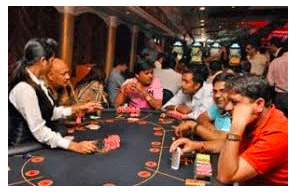The Indian Financial Express reports
The GST council set up a panel of members in the last week of May, which included ministers of different state governments, to examine GST payable in the online gaming industry. The discussion was directed in two broad areas: Whether such taxes are applicable on the entire quantum of platform fee and prize money contribution paid by the player, and the tax rate applicable thereon based on the nature of the game.
Online gaming and tax laws
In India, gaming platforms are required to pay GST as they qualify as suppliers. The registration fee is typically deposited in an escrow account. When the player plays a game, a portion of the fee (let’s say 10%) is transferred as ‘platform fee’ to the online host and is the revenue for the online operator.
The remaining 90% of the fee paid (actionable claim) is the prize pool and is transferred to a winner’s dashboard on winning a game.
Currently, such actionable claim excludes gambling, betting, or horse racing, for a game of skill (like fantasy football or rummy, etc.) unlike games of chance, such monies are not covered by specific valuation rules (Rule 31A) specified under the GST Rules, 2017. Thereby falling under the exceptions under the GST Act, 2017, for GST valuation.
What is online gaming according to regulators and courts in India?
The Supreme Court of India in 1996 through the K.R. Lakshmanan judgment has devised a guiding concept to govern the practice of online gaming/gambling. Games, where chance predominates over skill, are forbidden, while games, where skill prevails over chance, are permitted.
In fact, in comparison to other online games, courts have been rather demonstrative in establishing a space for fantasy sports. Both the Punjab & Haryana and the Bombay High Courts have concluded that the games offered by Dream 11 (Fantasy Cricket, Kabaddi, and Football, among others) demand skill, knowledge, judgment, and attention and are thus not considered to be coming under the scope of online gambling.
NITI Aayog’s 2020 consultation paper on gaming also conveyed the same sentiments as that of the Supreme Court because of the public interest factor and the differential treatment faced by fantasy sports games across the Indian states.
Despite this, in the absence of a regulatory mechanism authorities seem to have given E-sports a separate identity and have taxed gambling/horses betting in the same way as they tax E-sports.
Does the registration fee amount to betting?
Wagering or betting involves the transaction of money or any type of property to guess the outcome of a race, game, or any other unpredictable event. Section 30 of the Indian Contract Act makes agreements by way of wager, void, and unenforceable. The essentials to wager constitute the performance of the bargain depending upon the determination of an uncertain event where both the parties have mutual chances of gain and loss and where neither party has control over the happening of the event one way or the other.
However, paying registration fees for entering into E-sports tournaments is not the same as placing a wager on online games.
Unlike games of chance, in E-sports the amount of skill and talent involved in mastering the game has led to its professionalization. Also, in E-sports games, the prize money on winning is pre-declared and does not depend on the number of people joining the contest as in the case of other online games.
Arguing that E-sports registration is the same as betting and hence should be taxed in the same manner, is the same, as saying all sports/debates where a registration fee is required constitutes a betting event.
This is a ridiculous argument and one can hope that the authorities and Tax Council dwell into it further.
Conclusion: Opportune moment to define E-sports
Electronic Sports are organized competitions, for video game genres of traditional sports (archery, chess, football, cricket, etc.), multiplayer online battle arena (MOBA), real-time strategy (RTS), fighting & first-person-shooter (FPS).
E-sports athletes compete purely on their talent & skill to determine the performance/outcome.
Thus, in the gaming universe, skill vs. chance is now a passé issue. What needs to be closely examined is the difference between E-sports and other forms of online gaming. For online gaming to exist just as an exception to the definition of gambling under the law and yet being taxed in the same manner, seems unfair.
Moreover, a tax increase would only pass the burden of this payment on the E-sports players.
Taxing two services/goods in the same way just because they fall under the same sector implies that a cosmetic product or a tampon should be taxed the same way. These are differences the tax authorities have previously identified and one can hope it continues to do the same, even for E-sports.
It indeed is an opportune moment for the GST Council and other regulatory authorities to recognize E-sports as a category of online gaming and differentiate it from gambling and betting by defining it.
(The author is an investment and policy lawyer. Views expressed are personal and not necessarily that of Financial Express Online)




